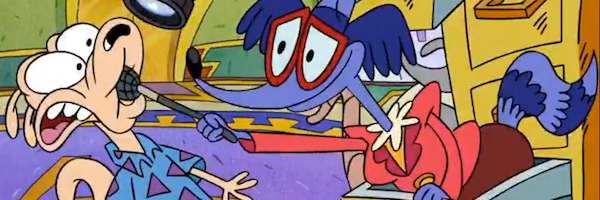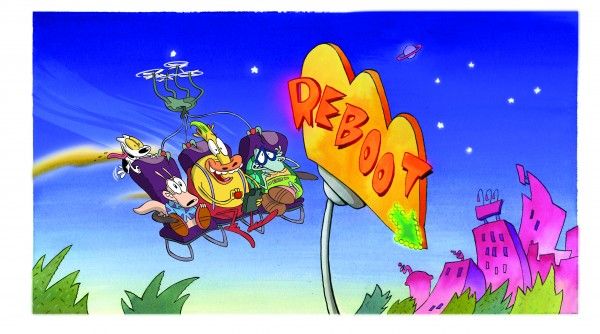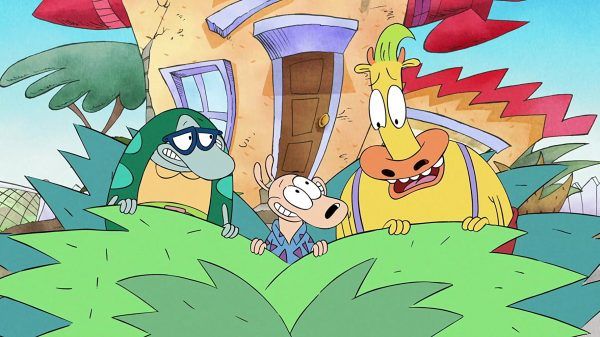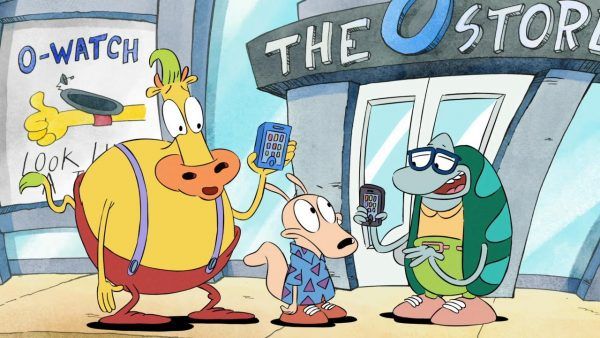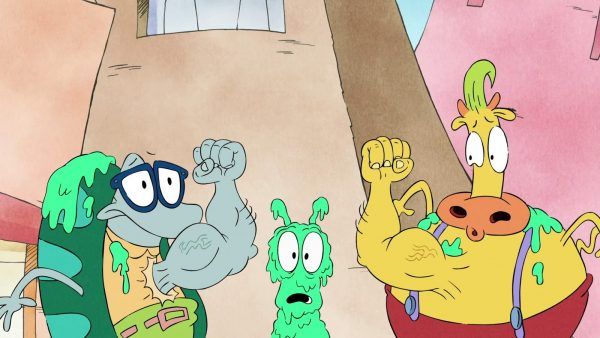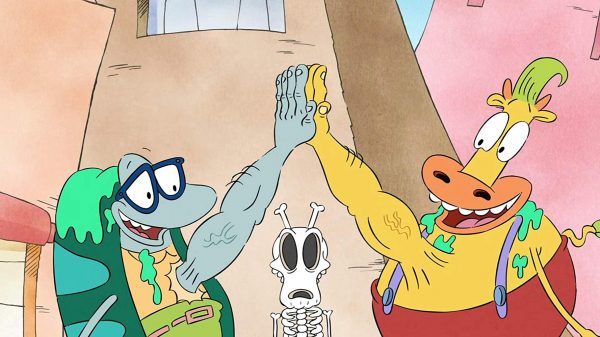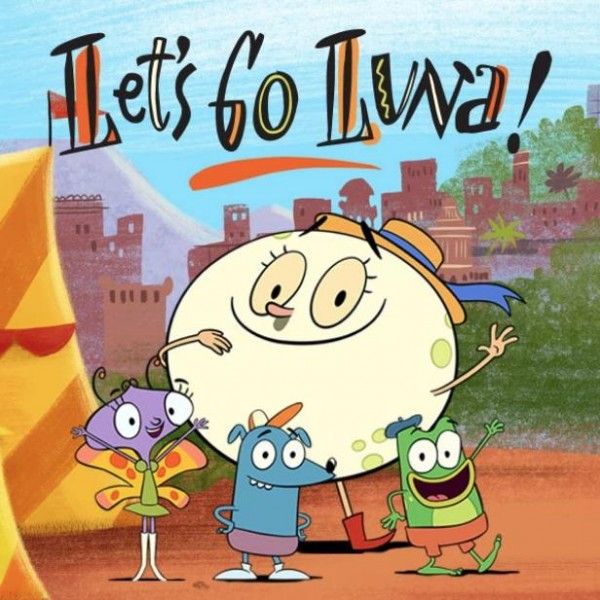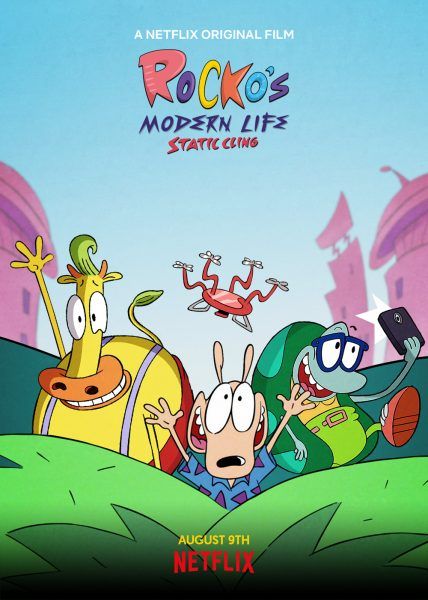More than 25 years ago, a highly stylized Nicktoon kickstarted the voice-acting careers of some of today's biggest names, like Carlos Alazraqui (The Fairly OddParents), Tom Kenny (SpongeBob SquarePants), and Mr. Lawrence (SpongeBob SquarePants). It was also one of the earliest projects for behind-the-scenes creatives like the late Stephen Hillenburg (SpongeBob SquarePants), Jeff "Swampy" Marsh (Phineas and Ferb), and Dan Povenmire (Phineas and Ferb). Also featuring the already legendary actor Charlie Adler, Rocko's Modern Life was a bit of a gamble by Nickelodeon and creator Joe Murray, who opted to bring in relatively unknown stand-up comedians to voice an everyman wallaby and his daft dog, a childlike steer, and a neurotic turtle as they attempted to navigate the modern world of the 1990s.
Now, in the 21st century, Rocko & Co. are back in the Nickelodeon-backed Netflix special, Rocko's Modern Life: Static Cling. (Try explaining that to 10-year-old me.) I had a chance to chat with Murray about the new special to find out what it was like to get the original voice cast back together, assembling an animation team who could field traditional hand-drawn aesthetics (a rarity these days), and whether or not Static Cling is the last Rocko story we'll ever see. Plus, Murray talked about his new PBS project Let's Go Luna!, a first for the cartoon creator and a younger-skewing demographic. But perhaps most importantly, we had a lengthy conversation about the special's character Rachel and the decision to feature her as a transgendered character who comes into conflict with her father, serving as the emotional heart of the story.
You can read what Murray had to say below, or you can listen to my review and our chat on the latest episode of the Saturday Mourning Cartoons podcast:
What is your mindset waiting to see how the world reacts to Rocko's Modern Life: Static Cling? What's that been like?
Joe Murray: It's a little strange, because it's been so long since we finished it. So yeah, it's a little nerve-racking. I don't know. I mean, from the people who have seen it already, I've gotten some good feedback. And I'm hoping that we stayed trued to what it was and also introduced some new things to say.
Since you mentioned it hadn't been done for a while, what was the process like in getting this project together as far as when the idea first came up, how difficult it was to get the original cast back together, and then seeing it finally get a release date?
Murray: Yeah, I mean, it felt so long ago that they came to me. I was actually completing the pilot for a PBS show that they have on the air right now. So it was a while ago they called me, and they just floated the idea, would I be interested in doing something as a special for Rocko? And I didn't really know if I wanted to do it. I didn't know whether it was something that should be even approached. I felt like we said a lot with the original series, but then the more I thought about it, and I started to some of the other guys who worked on the original show. And we started thinking about the new things that Rocko could go through. So I wrote a story that I really liked. Ad I told it to Nickelodeon, and they really liked it, so they decided to move forward with it.
So it was hard to get a new crew together. We had a couple people who worked on the original show. I reached out to a lot of people who had worked on the original one, but they were onto bigger and better things. So we had to find people that were able to ... Our backgrounds were all hand painted. We had to find people who were willing to paint in that style, and find an animation studio that still did hand drawn animation with a pencil and paper. And then we just immersed everybody into the Rocko culture.
We screened episodes every morning with cereal and tried to get everybody on board with what we were trying to do, so it was good. Yeah, we finished it, and it was originally supposed to have an air date, but then we thought, "Well ... " The Nickelodeon people thought maybe we could reach a wider audience, taking it somewhere else. There was already talk about what we were going to do with Netflix possibly. And so, yeah. And then we finally announced the air date, and here we are.
How was it getting the original voice cast back together though?
Murray: Yeah. Well, I had worked with a lot of them on my other shows, so I was still in touch. Tom Kenny is a close friend and Carlos Alazraqui and I go to baseball games together all the time, so they were on board. They knew about it way in advance. Charlie Adler, I always run into him, because he's now this big time voice director in a lot of studios. And so, I always run into him, so he was great. And Doug Lawrence, I'm still close with, so it wasn't hard to track them down. The only one that was hard to track down was Linda Wallem, who does the voice of Dr. Hutchinson. She fell off the radar, and none of us knew where she was.
And so, we finally did track her down and saw her for the first time in 20 years at the voice record, but it felt like it was just yesterday that we were all together, so it was fun. The only thing that was difficult was there was a heavy press presence at the record. So to try, and get a little bit more intimate, we tried to get as much done as we could that first day. But then I said, "Let's go back in without press, and try and do it right." Because it felt like everybody was putting on a show.
It probably felt like being fish behind aquarium glass, or something like that, with everybody staring at you.
Murray: Yeah, yeah. I mean, we were so used to ... I mean, when we did the Rocko records, I was in the room with them. I didn't sit behind the glass thing and talk to them through a microphone. I was there with them, and we were just all one big group. I always wanted to record ensemble, so we'd all be there together, and that's the way that it felt like it needed to be first to do it again. And everybody just ... yeah, it was fun.
That's great to hear, too. For Alazraqui and Kenny, those were the first ... the big stepping stone for what would go onto be a huge career. And you brought everybody in on this and animators that would go onto make other iconic series as well. So I think it needs to be mentioned how influential and important Rocko was to the last 20 years of animation. I think that needs to be mentioned. What are your opinions on that?
Murray: Yeah, I mean, it was a really a ripe time to be pulling people together who had the chops to be in this kind of art. So, Tom Kenny was a stand-up. Carlos Alazraqui was a stand-up, because I wanted people to do a lot of improv work. And so, I brought them in based on how funny they were and the voices they could do. And the other people, like Steve Hillenburg on the crew, I found him as an Independent animator. I met him at a film festival, where we both had Independent films. And I really wanted ... I wanted something that was going to be away from the normal television that was being done, so I steered away from anybody who really worked in television at the time. So that was the same thing ...
It was kind of funny that as soon as the word got out that I was starting to cast a show, I got contacted by a lot of people who were already in the industry. Like, Lucille Bliss called me, and she said, "This is Lucille Bliss, a voice legend." And Don Adams called me and said, "This is the voice of Maxwell Smart." And it's really strange. So I'm like, "All right, I'm a huge fan of yours, but really, I'm looking for something different."
So everybody that I tried to bring in were just fresh voices that had always wanted to do something. I mean, Steve Hillenburg didn't really know if he wanted to work in television either, and we just said, "Hey, they want us to do some cool stuff on television. Let's give it try." And Doug Lawrence came in. He had never directed before. And then there's a famous story with Doug, that when we were casting for Filburt, he stuck his audition tape into our box of tapes and didn't have a name on it. And i found it and said, "This is Filburt." And it turned out to be Doug. So then he went onto ... He was Plankton on SpongeBob, and he does a lot of stuff. So yeah, I lucked out in a lot of ways.
I'm happy to say it all worked out, yeah.
Murray: Yeah, I mean, somebody did a family tree of things that had gone on from Rocko, and it was pretty impressive. I hadn't really thought about it, but we had a lot of great talent. I mean, they all would have gone on to do great things regardless, but I was lucky enough to have them, yeah.
Yeah, that's a great start. And I mean, on the Rocko completed series, there's a great collection of behind the scenes featurettes and there's live reads with you and the cast from, I think, back in 2012. One of the episodes that's really featured a lot in there is Wacky Delly, one of the fan favorites, I believe one of your personal favorites. To me, it seems like Static Cling is almost a logical next step from that episode. How would you react to that? What do you think Static Cling is in terms of how it would relate to Wacky Delly?
Murray: I felt like when we sat down ... I had written a story basically about Rocko coming back after 20 years and missing this cartoon and having to find its creator and do all that. And then the progression of Rachel as a character really felt natural. And also, it felt like that we were saying something about this character, but also about relationships and about change and about having developed, you know? What are you going to go through in your life? There's a lot of soul searching involved, and Rachel always had a lot of soul searching going on.
Those episodes, The Wacky Delly and I Have No Son, which both featured the Fatheads, which were in a lot of ways very autobiographical for me. There was a lot, and that's why I did the voices, although I got dragged into doing the voices. But everybody just said, "You have to do the voices." But yeah, I don't know. It all worked really well and just felt natural. I think that's the thing about it. It felt like a real natural progression of a character and it just all worked out.
We were really fascinated about the behind the scenes discussions about that, the progression of how that idea came about. But then like you said, it was just a natural thing. So was that just a change that came to you, was it something more personal? If you want to talk about that. And I also know there's a shout out in the credits too. I believe Nick Adams of the organization GLAAD. So I was wondering what his contributions were to the story and to the character as well.
Murray: Yeah, well, basically, so I had written this story, and I said, "Rachel goes through a major change, and it's hard for her to come back and do the show." And so, we were discussing about things that worked, that we felt like would be a natural thing for Rachel to go through. And somebody brought up, that she'd transitioned. And I thought it was a great idea, and I also thought since the representation of transgender in the modern day has developed and progressed so much that, that was something we could celebrate and the progress of it. And that was a change in itself. So I went to Nickelodeon, and I pitched it. And it was a little ... they were a little shocked at first, and there was a little bit of hesitancy.
And so, Chris Viscardi, who was the executive, who was amazing on this project, went to Cyma Zarghami, who was the president of Nickelodeon at the time, and she thought it was great. She said, "Let's do it." And she said, "But only if we had GLAAD involved to make sure we do it right." And I was totally on board with that. I thought that was a great idea. So it was Cyma's idea, and she and Chris brought GLAAD in. So Nick Adams came in. And so, every step of the way, from the writing through the storyboards, through the ... he signed off on everything.
And he made some suggestions here and there, and we worked with him on a few development things with the character, and it worked out really well. And Nick loves the final movie, which I'm really glad about, GLAAD.
So are you at all curious, or worried, or anxious to see how the trans community, or the LGBTQ community responds to that?
Murray: Yeah, I'm curious. I took my daughter, my 10 year old daughter, to the screening last week, and she said, "You're going to get some flak for this." And I said, "How so? How do you feel?" And she said, "That maybe you did this as a bit of a gimmick." And I said, "Yeah, well, we didn't. We tried really hard not to do that, and I think it's a real ... " I mean, I can't ... whatever people say, there's going to be those who ... I'm assuming we're going to get people who are purists, who don't like the change. It was going to be the people like Rocko was in the episode, that we changed it too much. And you can't do anything about that. There's always going to be those people. But I feel like we came from a good place in our hearts when we were doing it, and if people are going to feel that way, you know, it's up to them. But I feel good about it.
Yeah, I feel like the beauty of that message is that change does happen and it's not all about you, and it's about the people around you, and being able to love and accept them and whatever they're going through. And whether it's a TV show, or your own flesh and blood, if people have that knee-jerk reaction, and they're just angry about change on whatever end of the spectrum, then they're missing the point of the special, and I'd encourage them to watch it again.
Murray: Right. I think I get a lot of questions about were we taking some swipes at extreme fandom and how things can be blown out of proportion. And I don't know if you know it, but when I was doing Rocko, I was just getting over the death of my wife. And there a lot of things going on, where the show was so big, and it's so great, and this is what it's all about. And the network was like, "Yeah, you need to put your life aside for the show." It was like, "No, there's other things that go in your life. It's not just all about shows." And as much as I liked the show, I had other things I had to deal with. And that was one of the reasons when we decided to stop at 65 episodes, because I needed to get on with things in my life, and I felt like Rachel went through the same thing. She just wanted to get done with the show with the Fatheads in the whole series. And there was definitely some 18 and longing, something that was missing.
And so, I related with that in some ways about that it's not just about the show, that there's so many different things in life besides a cartoon show. And I'm not trying to paint any bad picture about a fan, because I love the Rocko fans, and if it wasn't for the Rocko fans, we wouldn't have this special right now. I mean, that really is what made it. But there are a lot of important things other than the cartoon to think about in your life. And Rocko was an extreme in this special, to how far he wanted to go to get his cartoon back, but I wanted to bring it around at the end that there are other things that you should embrace.
Would you say that Rocko has been cathartic for you, or is that something that you find more catharsis, more outlet, in your other work that you do as well?
Murray: I feel like every project that I do has some personal element to it, that it's helping me navigate through whatever I'm going through. There was definitely a lot of Rocko during that time in my life, and I developed it before my wife died. So it was really something that life is bigger than ... it can be exaggerated and feel a lot stranger and more surrealistic than it really is, and especially when you're coming of age and there's so many different things coming at you at once.
I always felt there was something there about how we feel with attacking modern day life, whether it's fixing your house up, or having a neighbor hitting you, or whatever. There's all sorts of things in modern life, and I was dealing with them too. And everybody on the show, we were putting a lot of our own stuff in there. When we did the episode of I Have No Son, was a relationship between Ralph and his father, a lot of people wanted to work on that, because there was a lot of that within the crew. And so, there was a lot of personal feelings within the crew about the things that we were doing. And that was one of the things that really worked for the show. Yeah, and the show even I'm doing now for PBS has been a great ... It's actually about travel, and these kids are traveling around the world. And here I am, living in Belgium, so I'm relating on it.
It's funny because they are like, "Oh, Joe's going to Skype in from Belgium, and we have a writer who works in New Zealand. And then we have an L.A. office, and we have a Toronto." And so, we all come together and get on the same page with what we're doing. So it's a really a worldwide thing.
It's amazing that you can do that today; you couldn't do that 20 years ago, really.
Murray: That's true, that's true, yeah. I mean, it's interesting too, to see how far we've come in 20 years and how things have gotten scarier, and things have progressed in good ways and bad ways. It's been a wild time, so I felt like it was pretty rich for us to do something about that.
Since you mentioned your PBS show, did you want to talk about that for a minute since I don't know that I've caught up that one? So what's the title of that? Is it an animated show, and what specifically is that about?
Murray: It's called Let's Go Luna. It's been out since November, of 2018, and it's on PBS. It's the first time I've done something for this audience, but it's been really great. It's their first storyboard driven show that PBS has ever done, because that's the way I work as opposed to a script. I work in storyboard, and it has a lot of curriculum. We have an anthropologist on staff, who researches every city that we go to, then the cultures. And these three kids travel with their parents around the world in a circus. Then Luna, the moon, comes down and hangs out with them wherever they are. So it's a geography/culture type of show that explores the world around us. And even though it was developed before all the Trump-ism went down, I feel like it's really relevant now for kids to understand that there are other people around the world that are different and the same together.
No, absolutely, I feel like we can always use that, yeah.
Murray: Yeah, so I feel like ... everybody in the crew really feels like we're doing something substantial, and it's really gotten a great response. And it's funny. I try to make it so that ... because I've watched some shows with my kids when they were younger that I wasn't crazy about. It was kind of painful. So my goal was this was, let's have something that parents can watch with their kids and it's still ... I mean, it's a far cry from the subject matters we did on Rocko. We're still within the PBS brand in which I respect, so ... But also, I have a six-year-old and a three-year-old, so that six-year-old is one of my top advisors on what to do with the show.
It's a perfect test audience right there.
Murray: Gives you lots of ideas.
Exactly.
Murray: Yeah, every time I get a rough cut to look through, I screen it with him, and he tells me what he thinks.
He needs a producer credit.
Murray: He does. No, it was funny because when we're writing episodes ... So whenever I give him a bath, he likes ... he says, "Tell me a Luna story." So I'll test out stories. Yeah, I'll test out stories that we're writing at the time on him. But I can tell when he checks out, and I can tell when he's interested, and I can tell ... but it really is a serious sounding board for me, yeah. So I go back to the writers room, and I go, "You know what? Louis was not big on this part. And so, we're going to change this." It works out really well. But yeah, he should get a producer credit.
He absolutely should, yeah. He's going to be doing your job soon before you know it.
Murray: Yeah, well, he's a great artist too. He draws every second of the day. Who knows?
Bringing it back to Rocko real quick. You've got a long career ahead of you, do you think there are any other Rocko stories that are out there, or do you feel like Static Cling is a fitting send off for the franchise?
Murray: I think there are a lot of stories out there. Actually, when we did this, we had so much more material that we could pack into this, and we ended up cutting out some big scenes that I think would be great as an episode themselves. But it remains to be seen whether ... I think that it's going to see how much interest this generates. Whether anybody's interested in working with me to do more, I'd be opening to talking about it, but it would have to be the right circumstances. But I definitely feel like there's more to say, but I think the time is ripe still. And these characters still feel so relevant to me. I don't know, they just worked their way right into the 21st century so easily, I was shocked by it, but there's still so much to say. But I think that's the ultimate test about whether you should do anything else, is there more to say? And I feel there is, but we'll see. So I don't know.
Do you think there's any chance we might see some of those deleted storyboards if this makes its way to DVD or Blu-ray?
Murray: Possible. It's possible, it's possible. Everything's possible. Yeah, we have this whole great scene with Chokey Chicken, and that all got cut out, and it would have been great to do, but…
Well, I'm looking forward to seeing that someday, so hopefully it makes its way out into the world.
Murray: Yeah.
Rocko's Modern Life: Static Cling is now available to stream on Netflix.

